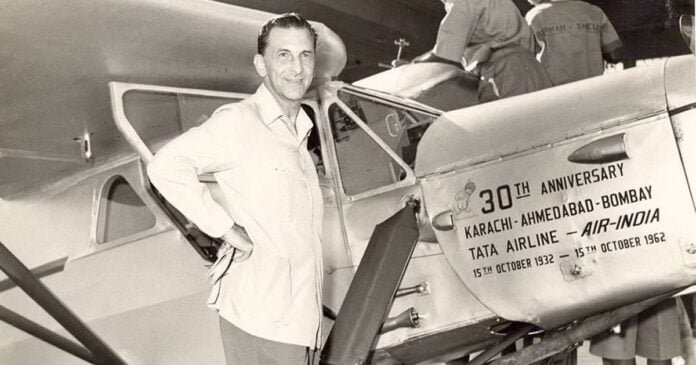
Jehangir Ratanji Dadabhoy Tata, fondly known as J.R.D. Tata, holds a remarkable position in Indian history as a pioneering aviator and visionary industrialist. His groundbreaking achievements in aviation, entrepreneurship, and philanthropy have left an indelible mark on India’s landscape. One of his most significant accomplishments was becoming India’s first licensed pilot, a feat that marked the beginning of a lifelong journey filled with innovation and contribution to the nation’s growth.
Early Life and Entrepreneurial Spirit
Born on July 29, 1904, into the illustrious Tata family, J.R.D. Tata inherited a legacy of business acumen and social responsibility. His father, Ratanji Dadabhoy Tata, was a prominent businessman, and his mother, Suzanne Brière, made her own mark as the first woman in India to drive an automobile. These early influences nurtured J.R.D.’s spirit of exploration and enterprise.
Aviation Pioneer
In 1929, J.R.D. Tata etched his name in history by becoming the first Indian to acquire a commercial pilot certificate. On February 10th of that year, the Aero Club of India, under the auspices of the Federation Aeronautique Internationale, awarded him license number “1,” a symbolic testament to his pioneering spirit. This achievement marked a significant milestone in the development of aviation in India.
Tata’s passion for flying led him to found Tata Airlines, which later evolved into Air India, the country’s national airline. His ambition to connect people and places through the skies culminated in a historic moment on October 15, 1932, when he piloted the first commercial flight from Karachi to Bombay in a single-seater aircraft, the D.H. Puss Moth.
Entrepreneurial Legacy
J.R.D. Tata’s contributions extended far beyond aviation. He emerged as a visionary entrepreneur, founding the Tata Group, a conglomerate that spans diverse sectors including steel, automobiles, energy, and hospitality. His commitment to excellence and ethical business practices set the standards for corporate governance and responsibility in India.
Philanthropy and Recognition
Tata’s enduring legacy also encompasses philanthropy and social welfare. His tireless efforts to uplift communities and improve the quality of life earned him numerous accolades, including the prestigious Bharat Ratna in 1992, India’s highest civilian honor. He was also recognized with the French Legion of Honour in 1983 and the Padma Vibhushan in 1955.
J.R.D. Tata’s journey from becoming India’s first licensed pilot to pioneering industrialist and philanthropist showcases his unwavering commitment to progress, innovation, and social responsibility. His trailblazing spirit and visionary leadership continue to inspire generations of Indians, leaving an enduring legacy that touches every corner of India’s development. J.R.D. Tata’s legacy is a testament to the power of one individual’s determination to transform a nation and shape its future.

